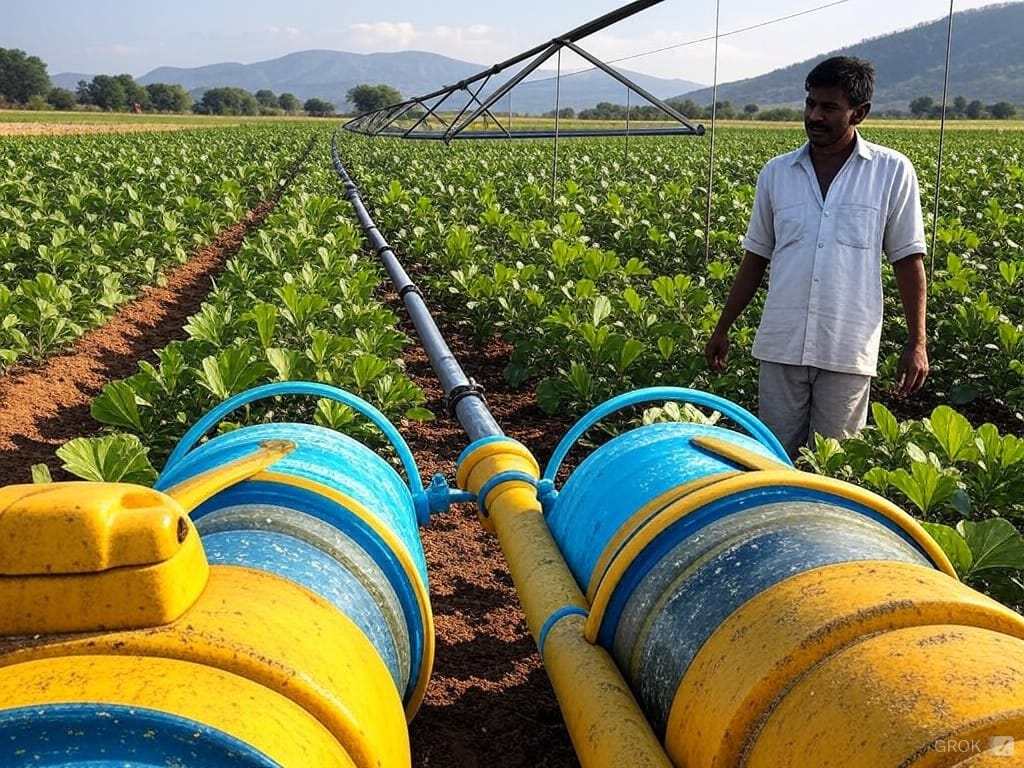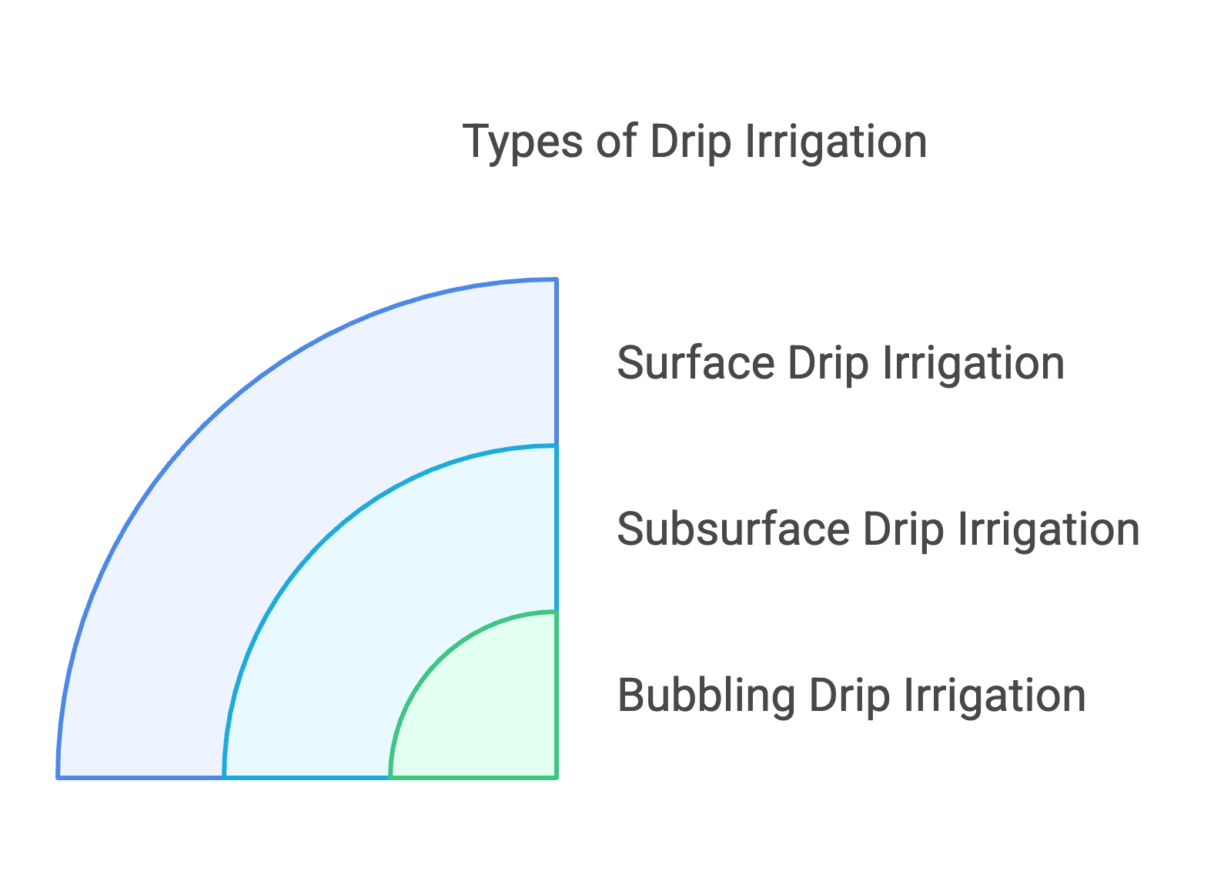
Water scarcity is one of the most pressing challenges facing agriculture in India’s Deccan Plateau. With an ever-increasing population and changing climate patterns, efficient water management has become crucial for sustaining agricultural productivity. Enter Enterprise Resource Planning (ERP) systems, which, when integrated with drip irrigation, are revolutionizing water usage and promoting sustainable farming practices. This article explores how ERP-enabled drip irrigation solutions are combating water scarcity in the Deccan Plateau, ensuring efficient resource utilization, enhancing crop yields, and supporting farmers in adapting to environmental changes.
The Deccan Plateau, covering parts of Maharashtra, Karnataka, Andhra Pradesh, and Telangana, is a significant agricultural hub in India. However, the region faces severe water shortages due to erratic rainfall, over-extraction of groundwater, and inefficient irrigation practices. Traditional flood irrigation methods, commonly used in the plateau, often lead to water wastage and soil degradation, exacerbating the scarcity issue.
Drip irrigation stands out as an efficient water management technique, delivering water directly to the plant roots through a network of pipes and emitters. This method minimizes evaporation and runoff, ensuring that crops receive the optimal amount of water needed for growth. By reducing water usage, drip irrigation not only conserves this vital resource but also enhances crop health and productivity.
Implementing agriculture erp software allows farmers to manage all aspects of their irrigation systems seamlessly. From scheduling irrigation cycles to monitoring water usage, ERP systems provide a centralized platform that enhances operational efficiency. By integrating drip irrigation data into the ERP system, farmers can make informed decisions about water distribution, ensuring that each crop receives the precise amount of water it needs.
One of the standout features of ERP systems is their ability to facilitate real-time monitoring of irrigation processes. Agritech erp software enables farmers to collect and analyze data from various sensors and IoT devices installed in their fields. This data-driven approach allows for continuous assessment of soil moisture levels, weather conditions, and crop health, enabling farmers to adjust irrigation schedules dynamically to match the evolving needs of their crops.
ERP implementation in agriculture plays a pivotal role in optimizing the use of water resources. By analyzing historical data and predicting future water requirements, ERP systems help farmers allocate water more efficiently. This ensures that water is used judiciously, reducing wastage and promoting sustainable farming practices. Additionally, ERP systems can integrate with weather forecasting tools to anticipate rainfall patterns, allowing farmers to adjust their irrigation plans proactively.
ERP systems integrated with drip irrigation significantly enhance water efficiency. By precisely controlling the amount of water delivered to each plant, farmers can reduce overall water consumption while maintaining or even increasing crop yields. This efficient water management is crucial for regions like the Deccan Plateau, where water scarcity poses a constant threat to agricultural productivity.
With optimal water delivery, crops receive the necessary hydration without the stress of over or under-watering. Farm erp software ensures that irrigation is tailored to the specific needs of different crops, promoting healthy growth and improving overall crop quality. Healthier crops are more resilient to pests and diseases, further boosting yields and ensuring a stable food supply.
Efficient water usage translates to significant cost savings for farmers. By reducing water wastage and lowering the costs associated with pumping and transporting water, drip irrigation systems integrated with ERP can enhance the profitability of farming operations. Moreover, the ability to monitor and manage resources more effectively leads to better financial planning and resource allocation.
ERP-enabled drip irrigation promotes sustainable farming by conserving water and reducing the environmental impact of agricultural practices. By ensuring precise water delivery and minimizing runoff, farmers can maintain soil health and prevent erosion. Sustainable practices also contribute to the long-term viability of farming, ensuring that future generations can continue to rely on agricultural productivity.
In the Deccan Plateau, a pioneering farming community implemented agriculture management erp alongside drip irrigation systems. By leveraging ERP software, the community was able to monitor water usage in real-time, adjust irrigation schedules based on crop needs, and forecast future water requirements. This integration led to a 30% reduction in water usage and a 20% increase in crop yields, demonstrating the effectiveness of ERP-enabled drip irrigation in combating water scarcity.
Another success story involves a rice farm in Karnataka that adopted rice industrial erp to streamline its irrigation and supply chain processes. The ERP system provided comprehensive insights into water usage, crop health, and market demands, enabling the farm to optimize its irrigation practices and ensure timely delivery of rice to markets. This holistic approach not only improved operational efficiency but also enhanced the farm’s reputation for quality and reliability in the global rice market.
A third example is a tea plantation in Telangana that integrated agriculture erp systems with its drip irrigation infrastructure. The ERP system enabled the plantation to track water usage, manage resource allocation, and implement sustainable farming practices. As a result, the plantation reduced its water consumption by 25% and improved soil health, ensuring the long-term sustainability of its agricultural operations.
The initial investment required for ERP systems and drip irrigation infrastructure can be a significant barrier for many farmers. However, the long-term benefits, including cost savings, increased yields, and sustainable resource management, often justify the upfront expenses. ERP software solution for agriculture can explore financing options, government subsidies, and phased implementation strategies to make these technologies more accessible to farmers.
Effective use of ERP systems and drip irrigation requires technical expertise, which may be lacking in some farming communities. Providing comprehensive training and support is essential to ensure that farmers can utilize these technologies effectively. Training and support for ERP in agriculture programs can bridge this gap, empowering farmers to harness the full potential of ERP-enabled drip irrigation solutions.
Managing sensitive farm data necessitates robust data privacy and security measures. ERP providers must ensure that their systems are secure and that farmers' data is protected against breaches. Implementing strong encryption protocols, regular security audits, and compliance with international data protection standards are critical steps in safeguarding information.
The future of drip irrigation in the Deccan Plateau lies in the seamless integration of ERP systems with emerging technologies such as IoT (Internet of Things), artificial intelligence (AI), and machine learning (ML). These technologies can provide deeper insights, automate routine tasks, and enhance decision-making processes, further optimizing irrigation practices and resource management.
While the Deccan Plateau is a prime candidate for ERP-enabled drip irrigation, this approach can be adapted to other regions and crops facing similar water scarcity challenges. By tailoring ERP solutions to meet the specific needs of different agricultural contexts, farmers across India can benefit from enhanced water management and sustainable farming practices.
Government policies and support play a crucial role in the widespread adoption of ERP-enabled drip irrigation. Incentives, subsidies, and training programs can encourage more farmers to adopt these technologies, ensuring that water scarcity is effectively managed and agricultural productivity is sustained. Agri flow initiatives can collaborate with government bodies to promote the benefits of ERP and drip irrigation, fostering a culture of innovation and sustainability in agriculture.
“Implementing ERP-enabled drip irrigation has transformed our farming operations. We now manage our water resources efficiently, boost our crop yields, and contribute to sustainable agriculture practices.”
— Ravi Sharma, Farmer, Deccan Plateau
ERP-enabled drip irrigation is more than just a technological upgrade; it is a strategic approach to combating water scarcity and promoting sustainable agriculture in India’s Deccan Plateau. By integrating ERP systems with advanced irrigation technologies, farmers can ensure efficient water usage, enhance crop productivity, and maintain the ecological balance necessary for long-term agricultural success. As the agricultural landscape continues to evolve, the synergy between ERP and drip irrigation will remain a vital component in driving the future of sustainable and resilient farming in India.
Exploring more about agriculture erp market and agriculture erp systems can provide deeper insights into how these systems are revolutionizing agricultural practices globally. Additionally, learning from enhancing cocoa production in Ghana with agricultural ERP offers valuable perspectives on the broader applications of ERP in promoting sustainable agriculture.
Farmers in the Deccan Plateau are not alone in their journey towards digital transformation. By connecting with global agri-business communities and sharing best practices, they can further enhance their operations. Engaging with platforms like Agri Flow and participating in international forums can provide opportunities for collaboration and innovation, ensuring that India remains at the forefront of sustainable agricultural practices.
The integration of ERP with drip irrigation highlights the multifaceted approach needed to combat water scarcity. By leveraging these tools, farmers in the Deccan Plateau can build resilience, enhance sustainability, and secure their agricultural future against the unpredictable challenges posed by climate change.
Drip irrigation systems use a network of pipes, tubing, emitters, and filters to deliver water directly to the root zone of plants. The technology typically includes pressure regulators, flow meters, and emitters that ensure consistent and precise water distribution, reducing water wastage and improving water use efficiency.
Smart drip irrigation is an advanced version of traditional drip irrigation that incorporates sensors, weather data, and automated systems to optimize water usage. It uses real-time data to adjust water flow based on environmental conditions, soil moisture levels, and crop needs, thereby increasing efficiency and reducing water waste.
Yes, drip irrigation can be automated. With the use of timers, soil moisture sensors, and weather-based controllers, a drip irrigation system can automatically turn on and off, adjusting the watering schedule based on the moisture content of the soil and environmental factors, reducing the need for manual intervention.
The three main types of drip irrigation are:

The 30/30 rule for drip irrigation refers to the recommendation that the spacing between emitters or drip lines should be approximately 30 cm apart, and the drip lines should be placed about 30 cm deep in the soil. This ensures proper water distribution and effective moisture penetration into the root zone.
Some disadvantages of drip irrigation include the initial installation cost, the need for regular maintenance to prevent clogging of emitters, and the potential for uneven water distribution if not designed properly. Additionally, in areas with high soil salinity, drip irrigation may cause salts to concentrate near the root zone.
The most efficient irrigation system is drip irrigation, as it delivers water directly to the roots of plants, minimizing evaporation and runoff. Drip irrigation uses water more efficiently compared to traditional systems like sprinkler irrigation, making it ideal for water conservation and ensuring that crops receive the right amount of moisture.
Links of interest:
Farm Management Software in India
Farm Management Software in Ethiopia
Farm Management Software in Ghana
Find Agriflow in other countries of Africa